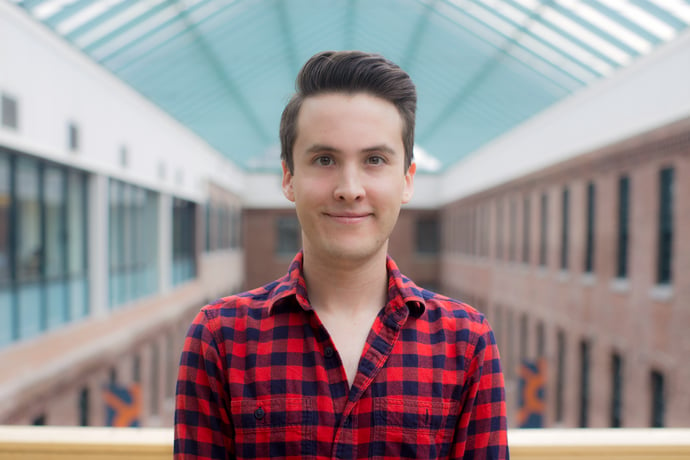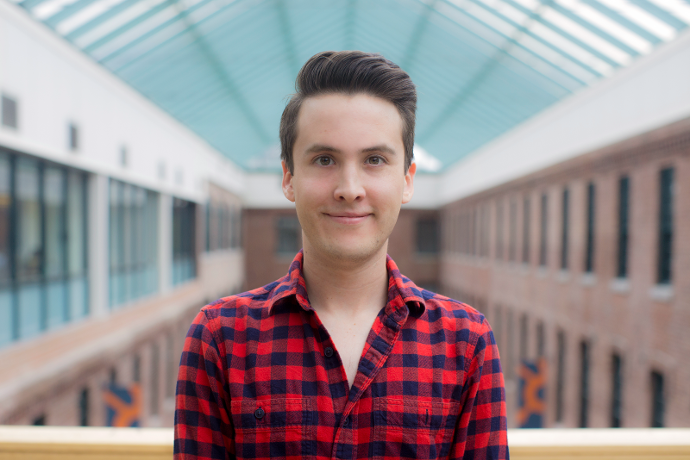
“If you could have anything in the world right now, what would it be?”
Some friends and I were having a heart to heart one evening, and a few guys tossed around the idea of having a big house or a nice car. But when the question came around to me, I answered without hesitation: “Stability.”
Three years ago, after graduating high school, I came out to my Hispanic Catholic family, and unfortunately, the experience wasn’t as positive as I had hoped. In an instant, my seemingly stable life spiraled out of control: my parents cried, said they “would never accept me the way I was,” and offered to get me conversion therapy. I clung to the thought that eventually they’d come around, but instead, my coming-out only served a catalyst for their own personal turmoil, as they quickly separated and moved out, leaving me alone in my childhood home that was under impending foreclosure.
I felt paralyzed.

The Chaos
I had planned to live at home, attend community college, save tuition money, and eventually transfer to a four-year in-state university. But as the date on the eviction notice quickly approached, this plan became laughable. How could I even think about college when I didn’t know where I was going to sleep, how I was going to afford food, and what tomorrow would bring?
“I didn't want to be defined by the circumstances life had handed me; I wanted to be defined by what I could do with the opportunities that lay ahead.”
|
Luckily, a friend’s family took me in, and I got a job stocking shelves at a retail store. But that was just a temporary fix. While most kids my age were trying to decide on a college major, I had to decide what I was going to invest 110% of my time in so that I could stay afloat.
After a few months of working retail, I started taking some classes at a local community college in architecture and transitioned over to graphic design, but I wasn’t in love with creating illustrations. One day, a friend mentioned that I might like building websites, and by time I created my first CSS hover state, I was hooked. Stocking shelves during the day, I spent nights and weekends reading every article on web development I could find.
Life 2.0
In web development, changing just a few lines of code can have a huge impact on how a web page behaves and looks. I was on a mission to do the same with my life, I needed to make a few choices in a small amount of time that would fundamentally change my future. So within eight months, I taught myself to code, applied to schools in Boston, and moved cross country, alone, for a fresh start.
Once I got into college, I felt like maybe I had finally caught up to my peers, and I hoped I would assimilate into some form of normalcy. A week into attending classes, however, I felt completely out of place. I still had to lie that I wasn’t hungry for lunch when in reality I couldn’t afford food. My heart still raced whenever I went to the store to buy essentials because I was worried that the bank would stop letting me overdraft my account. It was difficult to relate to people when conversations about going home for the weekend or spring break trips felt so horribly alienating.
On top of this, my peers had connections and established networks in Boston.
“I had no idea how to break into an industry that I so desperately wanted to pursue a career in; no concept of what opportunities were available to me.”
|
I needed to find a community where I could surround myself with people who were just as passionate to share their technical knowledge as I was eager to learn it.
Initially, I found the community I was looking for through my first internship at a startup accelerator called MassChallenge, and through connections I made there, joined a company called WeSpire as a QA Engineering Intern.
When I started at WeSpire, I had absolutely no idea what I was doing; the Ruby on Rails syntax looked like hieroglyphics to me. But I wanted to be an engineer, and I knew that anything I learned would get me one step closer to my goal. I would sit in front of the computer for hours scrolling through tutorials and Stack Overflow, trying to ignore emails reminding me that I was drowning in credit card debt. Fortunately, the time I invested in learning new coding languages allowed me to be able to build more things, which led to me being a more valuable employee, which led to a title change and quantifiable salary bump, and with it, the first taste of stability I’d had in years.
All I wanted was to be able to take someone I liked to dinner without worrying about the fact that it would put me even more in debt than I already was. I had to project a facade into the world of someone that had it far more together than I actually did, and I had to believe that at some point I wouldn’t have to any more. It’s true that money doesn’t buy happiness, and I value the connections I make with the people around me above all else. But, it’s extremely difficult to even think about making carefree happy memories or even just relaxing when the concern of your financial security is always in the back of your mind. Friends rallied around me, I cut out everything that was holding me down, and I kept moving forward.
Paying It Forward
Once I reached a place that somewhat resembled stability and became the first member of my family to hold a corporate job, I wanted to give back the opportunity that so many had given me up to that point. I connected with a non-profit that had just started at the time, called Resilient Coders, which was running a small after school program to spread code literacy to young people from traditionally underserved communities as a way to help break the cycle of poverty. Using what I’d learned from my own experience, I started teaching students that might not have had the opportunity to go to college, but who had an incredible passion for technology.
 Alec and some members of Resilient Coders
Alec and some members of Resilient Coders
Two years later, I now lead mentorship at Resilient Coders, and we’ve launched a bootcamp program in partnership with the Boston Police Department and an internal consultancy that lets our students work on real world projects. This experience has shown me first-hand that a four year university isn’t the end-all-be-all of talent sourcing. The mentees that I meet with every week, as well as the students I’ve taught through alternative-education programs, like Startup Institute, have gone on to earn full-time salaried positions at successful local tech companies, including Fresh Tilled Soil, The Grommet, The Boston Globe, and my current company HubSpot.
Bridging the Opportunity Gap
To outsiders, the tech industry often seems like an ivory tower. Even with the insane demand for engineers, the barrier of entry is almost too high for anyone that doesn’t have access to quality learning materials or copious amounts of free time. Additionally, when the perceived ideal persona of a tech worker is a white male with outstanding internships and a degree from a prestigious university, it alienates and discourages anyone that doesn’t fit that mold from even considering tech as a career path.
As a step toward diversifying the tech industry, today’s companies need to acknowledge and embrace the fact that some people, like me, have gotten to this “Point B” from a wide range of “Point A’s.” Diversity isn't just about hiring people with a certain skin color, gender, or sexual orientation. It's about first recognizing that we often have an unconscious bias favoring those who’ve had the same experiences as us, but then using this knowledge to consciously hire people with different perspectives, ideas, and non-traditional backgrounds.
That's how we raise the bar; that's how we challenge one another to think differently. I'd urge tech companies to look closer, because what people lack in experience and pedigree, they may make up for in passion.
“At the end of the day, while brilliance is everywhere, opportunity
|